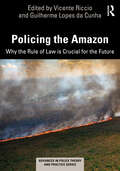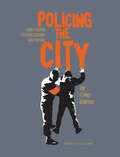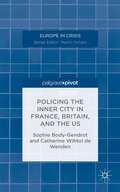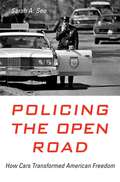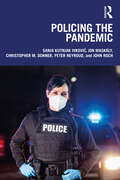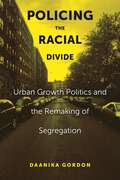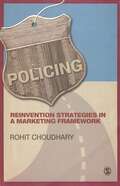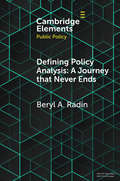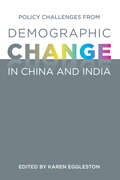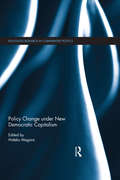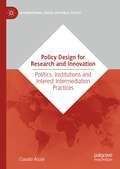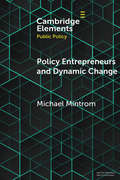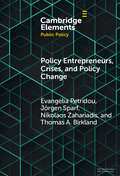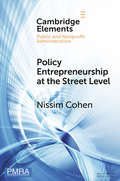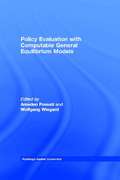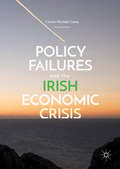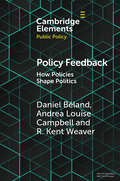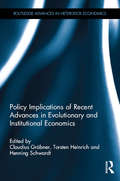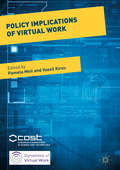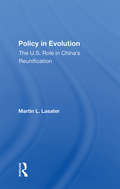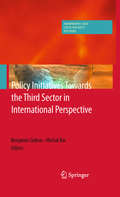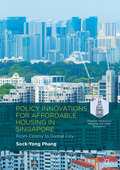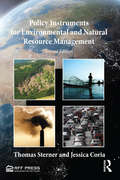- Table View
- List View
Policing the Amazon: Why the Rule of Law is Crucial for the Future (Advances in Police Theory and Practice)
by Vicente Riccio Guilherme Lopes da CunhaThis edited collection discusses the rule of law in the Amazon and the capabilities of the region’s sovereign states to police their territory considering security matters. Comprised of nine countries, including a European Union member, the Amazon region features states facing political instability, poverty, social inequalities, high levels of corruption, and lack of trust by their populations. This context is aggravated by the presence of criminal organizations operating there and shaping transnational bonds. Notably, the world’s foremost cocaine-producing countries—Colombia, Peru, and Bolivia—are located in the region, presenting related turmoil and instability. Moreover, as home to the largest rainforest on Earth and the widest biodiversity, the region is an object of concern due to environmental reasons. The protection of these natural resources as well as the traditional peoples living there is intertwined with issues of development, security, and policing.The book delves into questions on the international agenda, such as: how is it possible to sustain the rule of law in the Amazon? What are the states’ capabilities for controlling the territory and enforcing the law? How do these states deal with the growing urban violence in the region? What are the capabilities of public authorities for proposing laws and policies, and judicial systems to process, prevent, and suppress different crimes such as drug dealing, smuggling, human trafficking, terrorism, and environmental crimes?The book fills a gap in English-language scholarship exploring the context of the rule of law in the Amazon and the impact on policing activities. It is ideal for a wide range of audiences, including policing scholars, law enforcement and community leaders, and students focusing on criminal justice and the Amazon.
Policing the City: An Ethno-graphic
by Didier Fassin Frédéric DebomyAdapted from the landmark essay Enforcing Order, this striking graphic novel offers an accessible inside look at policing and how it leads to discrimination and violence.What we know about the forces of law and order often comes from tragic episodes that make the headlines, or from sensationalized versions for film and television. These gripping accounts obscure two crucial aspects of police work: the tedium of everyday patrols under constant pressure to meet quotas, and the banality of racial discrimination and ordinary violence. Around the time of the 2005 French riots, anthropologist and sociologist Didier Fassin spent fifteen months observing up close the daily life of an anticrime squad in one of the largest precincts in the Paris region. His unprecedented study, which sparked intense discussion about policing in the largely working-class, immigrant suburbs, remains acutely relevant in light of all-too-common incidents of police brutality against minorities. This new, powerfully illustrated adaptation clearly presents the insights of Fassin&’s investigation, and draws connections to the challenges we face today in the United States as in France.
Policing the Inner City in France, Britain, and the US
by Sophie Body-Gendrot Catherine Wihtol de WendenThis book analyzes and compares the police's inner city presence in France, the US, and Britain. Its authors' research points to the idea that the creation of a more inclusive environment is a sound approach for cities looking to better maintain peace, reduce discrimination, and manage the dynamic between police and citizens in inner cities.
Policing the Open Road: How Cars Transformed American Freedom
by Sarah A. SeoSarah Seo shows that the rise of the car, the symbol of American personal freedom, led to ever more intrusive policing, with devastating consequences for racial equality in our criminal justice system. Criminal procedures designed to safeguard us on the road undermined the nation’s commitment to equal protection before the law.
Policing the Pandemic
by Peter Neyroud Sanja Kutnjak Ivković Jon Maskály Christopher M. Donner John RochPolicing the Pandemic explores how police agencies in United Kingdom and the United States have adjusted to their changing environments, both during the peak of the COVID-19 pandemic and later, when the restrictions have been relaxed and the societies have begun to develop their new normal.Combining interviews and surveys of police officers and police administrators from the United Kingdom and the United States, this book provides a systematic and empirically based account of these changes and elaborates on the lessons for the future. The book offers insight into organizational and operational changes brought on by the pandemic, including the changes in their workload, enforcement activities, and administrative changes. It examines police perceptions of, and compliance with, pandemic-related changes, any potential COVID-19-related training, and the frequency with which they used various responses when observing violations of COVID-19 regulations and laws. It also focuses on police officers’ own fear of contracting COVID-19, whether they had been diagnosed with COVID-19, and how the pandemic affected their own health, stress, and general well-being.This book is an essential reading for scholars, policymakers, and police administrators tackling issues such as procedural justice, organizational change, and police officer well-being, as well as those more widely engaged with societal and legal consequences of the pandemic, be it the COVID-19 pandemic or any future pandemics.
Policing the Racial Divide: Urban Growth Politics and the Remaking of Segregation
by Daanika Gordon2023 Edwin H. Sutherland Book Award WinnerA behind-the-scenes account of the harsh realities of policing in a segregated city For thirteen months, Daanika Gordon shadowed police officers in two districts in “River City,” a profoundly segregated rust belt metropolis. She found that officers in predominantly whiteneighborhoods provided responsive service and engaged in community problem-solving, while officers in predominantly Black communities reproduced long-standing patterns of over-policing and under-protection. Such differences have marked US policing throughout its history, but policies that were supposed to alleviate racial tensions in River City actually widened the racial divides. Policing the Racial Divide tells story of how race, despite the best intentions, often dominates the way policing unfolds in cities across America.Drawing on in-depth interviews and hundreds of hours of ethnographic observation, Gordon offers a behind-the-scenes account of how the police are reconfiguring segregated landscapes. She illuminates an underexplored source of racially disparate policing: the role of law enforcement in urban growth politics. Many postindustrial cities are increasing the divisions of segregation, Gordon argues, by investing in downtowns, gentrified neighborhoods, and entertainment corridors, while framing marginalized central city neighborhoods as sources of criminal and civic threat that must be contained and controlled. Gordon paints a sobering picture of modern-day segregation, and how the police enforce its racial borders, showing us two separate, unequal sides of the same city: one where rich, white neighborhoods are protected, and another where poor, Black neighborhoods are punished.
Policing: Reinvention Strategies in a Marketing Framework
by Rohit ChoudharyA first-of-its-kind, this book proposes a marketing plan for the police, using the conventional framework of marketing management. While there is considerable discussion and criticism of the way the police force functions in India, no comprehensive alternative model has been proposed to implement the New Police Management (NPM) approach in the force′s operations. In fact, the necessity for overhauling the police system is strongly felt all over the world in the light of the recent international security lapses. The framework that this book suggests comprises current situation analysis, SWOT analysis, STP analysis and the 8 Ps. Policing: Reinvention Strategies in a Marketing Framework combines marketing principles with the empirical knowledge of police operations to suggest improvements in the Indian police force. It uses the marketing motto of ′keeping the customer at the centre′ as key to finding solutions to the issues that the police face in their everyday operations. In addition, it carries case studies related to police operations from across the world and suggests ways of adapting the strategies used in these to the Indian context. In doing so, the book offers valuable inputs for police academies, public administration, public policy, and state security commissions, as it not only analyses the current situation in the police force, but also draws a clear and practicable roadmap to revamp it.
Policy Analysis: Theory and Practice (Elements in Public Policy)
by Beryl A. RadinFor much of its life, the field of policy analysis has lived with a wide range of definitions of its goals, work and significance in the society. This Element seeks to sort out these differences by describing the issues, players and developments that have played a role over the life of this field. As a result of the relationships that have developed an environment has emerged where both academics and practitioners who self identify as 'policy analysts' are not always recognized as such by others who use that same label. This Element explores the reasons why this conflictual situation has developed and whether the current status is a major departure from the past. While these developments may not be new or found only in policy analysis, they do have an impact on the status of the academics as well as the practitioners in the field.
Policy Challenges from Demographic Change in China and India
by Karen EgglestonThe world's two most populous countries face numerous policy challenges from rapid demographic change, including gender imbalance, population aging, and rapid urbanization. Drawing on social science expertise from China, India, and the United States, the contributors examine the social and economic challenges for policy across a range of domains, from family planning and old-age support to human capital investment, poverty alleviation, and broader issues of governance. Sections focus on: Policy challenges and economic impact Fertility and sex imbalance Human capital and urbanization Population aging
Policy Change under New Democratic Capitalism (Routledge Research in Comparative Politics)
by Hideko MagaraDemocratic capitalism in developed countries has been facing an unprecedented crisis since 2008. Its political manageability is declining sharply. Both democracy and capitalism now involve crucial risks that are significantly more serious than those observed in earlier periods. The notion of policy regimes has gained new significance in analysing the possibilities for a post-neoliberal alternative. Policy innovations directed towards an economic breakthrough require both political leadership and a new economic theory. The processes of political decision making have become quite distant from the public realm, and a limited number of economic and political elites exert influence on public policy. This book examines, from a policy regime perspective, how developed countries attempt to achieve such a breakthrough at critical junctures triggered by economic crises. It initially assesses the nature of the present crisis and identifies the actors involved. Thereafter, it provides an analytical definition of a crisis, stressing that most crises contain within them the potential to be turned into an opportunity. Finally, it presents a new analytical design in which we can incorporate today’s more globalized and fluid context.
Policy Coordination in the European Monetary System
by International Monetary FundOver the last four decades, one area that has evolved rapidly in the international economy, albeit not without periodic setbacks, has been the domain of economic interdependence. As noted by Cooper (1968) early on, the increasingly close linkages that interdependence has prompted among national economies can either enhance or constrain their ability to pursue domestic objectives.
Policy Design for Research and Innovation: Politics, Institutions and Interest Intermediation Practices (International Series on Public Policy)
by Claudia AcciaiThis book investigates the determinants of policy design choices in an area of public policy embracing multiple sectors of public responsibilities: Research and Innovation (R&I). Drawing on case studies from France and Italy, it assesses how governments design research and innovation policy strategies. It also examines how policymakers and stakeholders translate their interests into different design strategies, and the impact of varying political orientations and institutional setups on shaping choices for alternative policy instruments. Lastly, the book considers how the interactions between policy makers and policy takers influence policy design choices. It will appeal to scholars and students of comparative public policy, public administration, emerging technologies, and governance.
Policy Entrepreneurs and Dynamic Change (Elements in Public Policy)
by Michael MintromPolicy entrepreneurs are energetic actors who engage in collaborative efforts in and around government to promote policy innovations. Interest in policy entrepreneurs has grown over recent years. Increasingly, they are recognized as a unique class of political actors, who display common attributes, deploy common strategies, and can propel dynamic shifts in societal practices. This Element assesses the current state of knowledge on policy entrepreneurs, their actions, and their impacts. It explains how various global forces are creating new demand for policy entrepreneurship, and suggests directions for future research on policy entrepreneurs and their efforts to drive dynamic change.
Policy Entrepreneurs, Crises, and Policy Change (Elements in Public Policy)
by Nikolaos Zahariadis Evangelia Petridou Jörgen Sparf Thomas BirklandIncreasingly, policymaking takes place while extraordinary events threaten fundamental societal values. During turbulent times, policy entrepreneurs emerge as pivotal figures. They are energetic actors who pursue dynamic change in public policy and, whereas we know much about how they promote innovation and change in normal policymaking, we know less about how they behave in crises, and even less about how different crises influence policy entrepreneurial action. This Element focuses on interaction between policy entrepreneurs and crises. It analyzes policy entrepreneurial action in six case studies – three fast-burning and three creeping crises – to ascertain policy entrepreneurs' strategies and effectiveness during extraordinary events. It proposes crisis policy entrepreneurial strategies, a framework to understand outcomes based on policy entrepreneurial action and type of crisis and suggests avenues for further research on policy entrepreneurs and crises, including implications for crisis managers. This title is also available as Open Access on Cambridge Core.
Policy Entrepreneurship at the Street Level: Understanding the Effect of the Individual (Elements in Public and Nonprofit Administration)
by Nissim CohenThis Element aims to connect the literature of street-level bureaucrats with that of policy entrepreneurship in order to analyze why and how bureaucrats operating at the street level can promote policy change in public administration at the individual level. I demonstrate how street-level bureaucrats act as policy entrepreneurs in different contexts around the globe to promote policy change and analyze what they think of policy entrepreneurship and what they do about it in practice. For this purpose, I use multiple research methods: a survey, in-depth interviews, focus groups and textual analyses. I also offer recommendations to decision-makers to promote street-level policy entrepreneurship, highlighting the benefits of doing so. Lastly, I critically discuss the normative aspects of street-level policy entrepreneurship: ultimately, is it desirable?
Policy Evaluation with Computable General Equilibrium Models (Routledge Applied Economics #Vol. 1)
by Amedeo Fossati Wolfgang WiegardComputable General Equilibrium (CGE) modelling is a relatively new field in economics, however, it is rapidly becoming one of the most useful tools for policy evaluation. This book applies CGE modelling to some of the most urgent international economic policy problems, including the Kyoto Protocol, pension reform, and income taxation, and also analyses the methodological issues that arise.
Policy Failures and the Irish Economic Crisis
by Ciarán Michael CaseyThis book seeks to understand why almost all commentators on the Irish economy were unprepared for the scale of the recent economic crisis. It analyses the public contributions from a broad range of observers, including domestic and international agencies, academics, the newspapers and politicians. This approach gives new insights into the analytical and institutional shortfalls that inhibited observers from recognising the degree of the risk. The book demonstrates that most commentators were either impeded in what they could say, or else lacked the expertise to challenge the prevailing view. The findings have significant implications for a broad range of institutions, particularly the media and the Oireachtas (the Irish Parliament).
Policy Feedback: How Policies Shape Politics (Elements in Public Policy)
by Andrea Louise Campbell R. Kent Weaver Daniel BélandAlthough the idea that existing policies can have major effects on politics and policy development is hardly new, the last three decades witnessed a major expansion of policy feedback scholarship, which focuses on the mechanisms through which existing policies shape politics and policy development. Starting with a discussion of the origins of the concept of policy feedback, this element explores early and more recent contributions of the policy feedback literature to clarify the meaning of this concept and its contribution to both political science and policy studies. After exploring the rapidly expanding scholarship on policy feedback and mass politics, this element also puts forward new research agendas that stress several ways forward, including the need to explain both institutional and policy continuity and change. Finally, the element discusses the practical implications of policy feedback research through a discussion of its potential impact on policy design. This title is also available as Open Access on Cambridge Core.
Policy Implications of Recent Advances in Evolutionary and Institutional Economics (Routledge Advances in Heterodox Economics #31)
by Henning Schwardt Claudius Grabner Torsten HeinrichThis collection is inspired by the coming retirement of Professor Wolfram Elsner. It presents cutting-edge economic research relevant to economic policies and policy-making, placing a strong focus on innovative perspectives. <P><P>In a changing world that has been shaken by economic, social, financial, and ecological crises, it becomes increasingly clear that new approaches to economics are needed for both theoretical and empirical research; for applied economics as well as policy advice. At this point, it seems necessary to develop new methods, to reconsider theoretical foundations and especially to take into account the theoretical alternatives that have been advocated within the field of economics for many years. This collection seeks to accomplish this by including institutionalist, evolutionary, complexity, and other innovative perspectives. It thereby creates a unique selection of methodological and empirical approaches ranging from game theory to economic dynamics to empirical and historical-theoretical analyses. <P><P>The interested reader will find careful reconsiderations of the historical development of institutional and evolutionary theories, enlightening theoretical contributions, interdisciplinary ideas, as well as insightful applications. The collection serves to highlight the common ground and the synergies between the various approaches and thereby to contribute to an emerging coherent framework of alternative theories in economics. This book is of interest to those who study political economy, economic theory and philosophy, as well as economic policy.
Policy Implications of Virtual Work
by Vassil Kirov Pamela MeilThis collection presents an array of policy debates and implications emerging from virtual work. The authors cover a range of areas, including: conceptual debates, measuring virtual work; discourses and levels of policy intervention; the role of the sharing and collaborative economy; and resultant challenges for organized labour, law and regulation. The authors of the chapters analyse the ways in which processes of digitalization leading to virtual work impact so many aspects of our lives: the way we buy, sell, network, communicate, participate, create, consume, and, of course, the way we work. In turn they focus on the subsequent implications for the future of work as well as the viability of existing social protection systems. The developments examined here are salient for both policy stakeholders and for the academic community in areas such as labour sociology, industrial relations, gender studies, political economy, and economic geography.
Policy In Evolution: The U.s. Role In China's Reunification
by Martin L LasaterThe reunification of Taiwan with China is one of the most important policy issues of our time. The issue has broad strategic, political, economic, and moral ramifications for the U.S., as well as for Chinese on both sides of the Taiwan Strait. The People's Republic of China (PRC) has assigned top political priority to reunification and has made the
Policy Initiatives Towards the Third Sector in International Perspective
by Benjamin Gidron Michal BarOver the past decade, the third sector has had tremendous growth worldwide in both size and importance. As many countries struggle to address this changing reality, many have adopted policy initiatives aimed at changing the ways the third sector is addressed. It is a complex process, involving different fields of practice, different levels of government, and different types of third sector organizations. The contributions to this timely volume detail the process as carried out in eight diverse countries: US UK, Canada, Hungary, Germany, Ireland, Israel, Japan, all of whom have recently enacted policy initiatives towards the third sector. The studies are comprehensive: from reviewing the current policy, enacting new laws, supervisory mechanisms, and modes of funding. Featuring a postscript from Helmut Anheier (UCLA School of Public Policy, Los Angeles, CA, USA and Hertie School of Governance, Berlin, Germany), the thorough analysis in this volume will provide a new understanding of the policy initiatives in the eight countries studied, as well as guiding principles for other countries that may implement such initiatives in the future. The resulting work will give researchers in sociology, social work, third sector research, and international economics a new framework for understanding the Third Sector: its role in society, and its relationships with government, the market, and the citizens of the country.
Policy Innovations for Affordable Housing In Singapore: From Colony To Global City (Palgrave Advances In Regional And Urban Economics Ser.)
by Sock-Yong PhangGlobal cities today are facing fundamental challenges in relation to unaffordable housing and growing economic inequality. Singapore’s success in making homeownership possible for 90% of its population has attracted much attention internationally. This book represents a culmination of research by the author on key housing policy innovations for affordable housing.Housing policy changes were effected in the 1960s through reforms of colonial legislation and institutions dealing with state land acquisition, public housing, and provident fund savings. The comprehensive housing framework that was established enabled the massive resettlement of households from shophouses, slums and villages to high-rise government-built flats. In the 1980s and 1990s, housing market and land use regulations were amended in response to the changing needs of a growing economy.Housing policies have also been utilised to curb housing speculation, build racially inclusive communities, and reduce wealth inequality. More recently, an ageing population of homeowners has necessitated focus on policies for housing equity extraction. This landmark title is of relevance to all developing economies exploring alternative systems of affordable housing.
Policy Instruments for Environmental and Natural Resource Management
by Thomas Sterner Jessica CoriaThomas Sterner's book is an attempt to encourage more widespread and careful use of economic policy instruments. The book compares the accumulated experiences of the use of economic policy instruments in the U.S. and Europe, as well as in rich and poor countries in Asia, Africa, and Latin America. Ambitious in scope, it discusses the design of instruments that can be employed in any country in a wide range of contexts, including transportation, industrial pollution, water pricing, waste, fisheries, forests, and agriculture. While deeply rooted in economics, Policy Instruments for Environmental and Natural Resource Management is informed by political, legal, ecological, and psychological research. The new edition enhances what has already been widely hailed as a highly innovative work. The book includes greatly expanded coverage of climate change, covering aspects related to policy design, international equity and discounting, voluntary carbon markets, permit trading in United States, and the Clean Development Mechanism. Focusing ever more on leading ideas in both theory and policy, the new edition brings experimental economics into the main of its discussions. It features expanded coverage of the monitoring and enforcement of environmental policy, technological change, the choice of policy instruments under imperfect competition, and subjects such as corporate social responsibility, bio-fuels, payments for ecosystem services, and REDD.
Policy Issues in the Evolving International Monetary System (EPub)
by Peter Isard Mark P. Taylor Paul R. Masson Morris GoldsteinHow can international monetary stability be promoted? This study looks at ways to bolster economic policies and coordination among the industrial countries serving as nominal anchors for the world economy. It also assesses the operation of monetary unions and common currency areas. The authors conclude that problems with the world monetary system reflect weaknesses outside the exchange rate arena, and that exchange rate commitements must be tailored to individual country characteristics.
